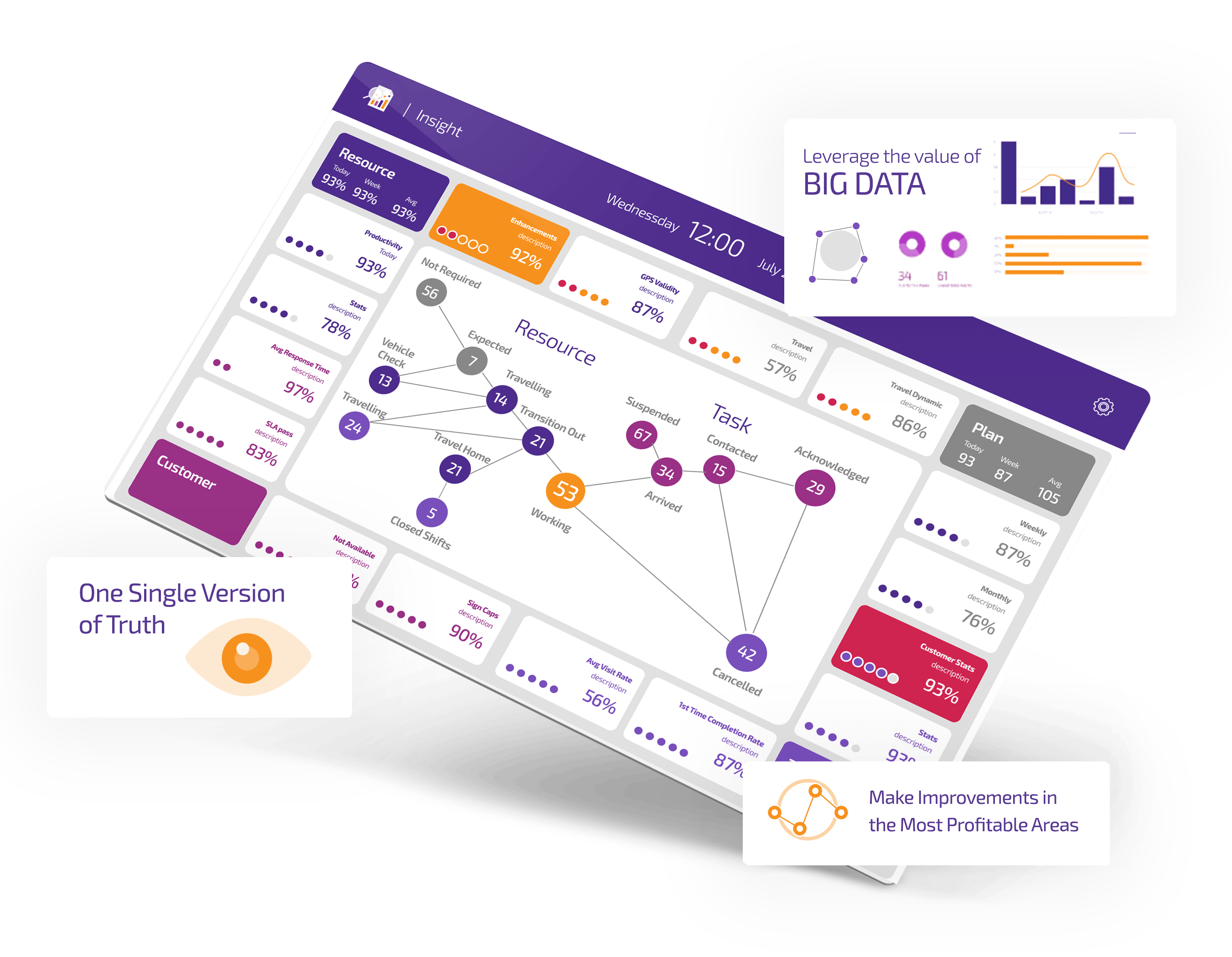What’s the difference between Operational Intelligence and Business Intelligence?
Do you know the difference between Operational Intelligence (OI) and Business Intelligence (BI)? It’s an important question and one we believe you should know the answer to. Why? Understanding the clear differences between these two business approaches provides an important context to the information your field service intelligence platform presents. We believe transparency on industry-specific terminology is essential to furthering your field service journey. This is especially true with the anticipated surge in Field Service Management (FSM) adoption by organizations in a post-pandemic market.

Speaking of Context…
Big data is swamping organizations. In fact, 80-90% of corporate big data is stored without structure. This presents a problem; many organizations lack the tools and technologies necessary to extract business value from this disordered data resource. Thankfully for FSM, technologies such as our real-time data and field service intelligence solution ‘Insight’ are remedying this, enhancing the rapid decision making and response capability of field managers further.
These advances in big data processing can identify underlying business performance patterns, whether good or bad. By understanding real-time operational patterns, managers & organizations are empowered to consistently improve and elevate ongoing service delivery as it happens. This can benefit specific pain points in field service delivery such as compliance, employee productivity and job efficiency. Previously, identifying these patterns was simply too complex for traditional BI applications to spot when looking retrospectively. This is why understanding operational intelligence and the opportunities it presents is key as OI picks up where traditional business intelligence leaves off.
You can easily argue that all information originating from enterprise operations is a form of business intelligence. Both operational intelligence and business intelligence drive action and inform decision making after all. Additionally, BI and OI terms have been used interchangeably in the past. This quickly becomes confusing and incorrect, so let us clear the air.
Defining Business Intelligence (BI) & Operational Intelligence (OI)

What is BI?
Simply put, Business Intelligence (BI) combines the tools, applications & infrastructure necessary to leverage historical data for performance optimization by executives. BI data sets typically involve taking a snapshot of data recorded over a defined period in the past. This data is then reviewed and presented to executives with decisions made based on the patterns revealed. Contrary to mainstream belief, business intelligence is different from data analytics. Data analytics is the process of studying data to draw conclusions. Business intelligence however involves strategic decision-making based on that data.
What is OI?
Conversely, Operational Intelligence (OI) is the immediate business intelligence workers & managers gain from ongoing field operations. OI takes data collected by or about teams in the field and combines it with other data sources and technologies using predictive analytics and machine learning. This provides an unprecedented, practically real-time view of what is happening in the field – pretty slick! In field service, this data is presented in a series of interactive, personalized indicator panels showing the status of key performance indicators (KPIs). The information presented here is dynamic and evolves as the status of service delivery and operations change over the course of the day.
When presenting information in this format, managers can pursue immediate action and stay in control (often of the uncontrollable). This ensures higher rates of customer satisfaction, increased worker productivity and efficient resource allocation.


The difference in a nutshell…
So, what’s makes BI different from OI? Business intelligence delivers visibility and insight based on historic events. Comparatively, we know that field service operations are dynamic and everchanging day by day, hour by hour. BI data sources quickly become irrelevant as more time passes. We feel this necessitates operational intelligence as a means to optimize field service delivery and operational efficiency. OI delivers visibility and insight into data streamed live from business operations. This enables real-time and responsive decision making by managers. Moreover, problems can be handled discretely before they have even arisen and employee productivity can be maximized as operations progress through the working day. Combined, this gives organizations who utilize OI a significant operational and competitive advantage in their field operations.
The Future of Operational Intelligence & Business Intelligence
Did you know business intelligence as a practice predates the digital age by over 100 years? Despite mental images of top hats, cabooses and peerless moustaches, the reality is that business intelligence has been around for a long time. In fact the first mention of the term is found in Richard Miller Devens’ 1865 work Cyclopaedia of Commercial and Business Anecdotes. Contemporary belief however is that BI has reached a peak. This is despite the far-reaching proliferation of BI by enterprises across the world. It’s in this post-pandemic paradigm that we’ve experienced seismic industry shifts with profound alterations to business decision making. ‘Future’ decisions were once defined as decisions made at a quarter or monthly level. This has rapidly decreased to mere days or weeks in advance.
Over the past 2 years, entire industries and commercial giants have switched course seemingly overnight – with mixed levels of success. This turbulent business environment raises the desirability of operational intelligence for an organization looking to make informed decisions in the ‘here and now’. For business intelligence advisors, OI represents an incredible opportunity to meet the unpredictable nature of field operations post-pandemic. Operational intelligence investigates deeper complexities. These deeper insights support meaningful and informed decision making for medium and large scale businesses in this volatile environment, an environment that looks set to remain.
Putting This into Action
At Totalmobile, we empower clients with actionable, strategic and data-driven intelligence with our Insight solution. Insight provides genuine, real-time analytics that enables users to review everything that is happening in their business, as it happens. Coupled with one comprehensive dashboard, users can view multiple performance metrics with potential areas of risk highlighted that may need attention.
By taking snap shots throughout the day, users can replay the day as it occurs and view how service metrics develop over time. Insight is a comprehensive business analytics and operational intelligence solution that offers a real time view of service delivery. Additionally, a clear understanding of performance gives organizations an unprecedented comprehension of operational performance. This empowers them to make decisions based on facts and drive continuous improvement.

Totalmobile ‘Insight’
With all of this in mind, you can see how different ‘Operational Intelligence’ & ‘Business Intelligence’ really are. As we move into the post-pandemic world, the opportunities & potential value operational intelligence represents for organizations is considerable. Also, you’ve made it all the way to the end of this blog! In other words, you may be ready to view our demo. If so, contact us here.







